Quora ads and Facebook ads are two popular platforms for digital advertising, each offering unique opportunities to reach and engage with audiences. Quora, a question-and-answer platform, allows advertisers to promote their products or services alongside relevant content, while Facebook provides a vast network for targeting users based on their interests, demographics, and behaviors.
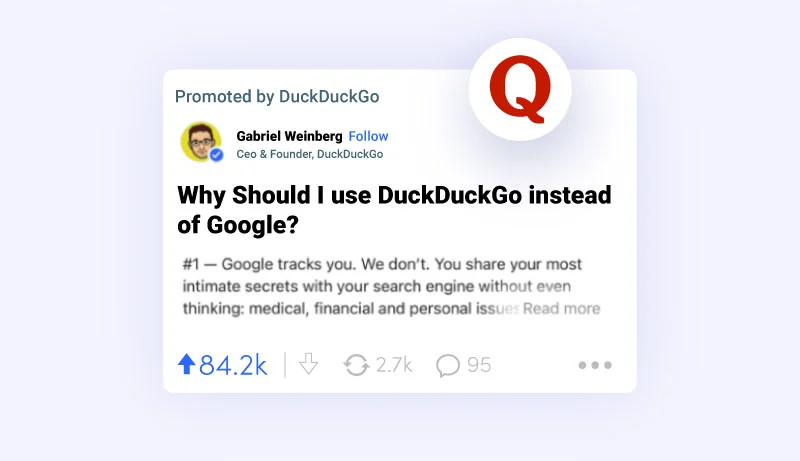
Understanding the differences between these two platforms is crucial for advertisers to make informed decisions about their advertising strategies. By exploring the distinct features, targeting options, and audience characteristics of Quora ads vs. Facebook ads, businesses can effectively allocate their resources and maximize their advertising efforts.
Quora Ads vs. Facebook Ads: Key Differences
| Aspect | Quora Ads | Facebook Ads |
|---|---|---|
| Targeting Options | Topic and question-based targeting | Interests, demographics, behaviors, and more |
| Ad Format and Placement | Primarily text-based ads | Image ads, video ads, carousel ads, and more |
| Audience Characteristics | Highly engaged users seeking knowledge and insights | Diverse user base with high levels of engagement |
When it comes to targeting options, Quora ads and Facebook ads each take a unique approach. Facebook allows advertisers to target users based on their interests, demographics, behaviors, and even their interactions with the platform. On the other hand, Quora focuses on targeting users based on the topics and questions they engage with, ensuring that ads are displayed in a contextually relevant environment.
In terms of ad format and placement, Facebook offers a wide variety of formats, including image ads, video ads, carousel ads, and more. These ads can appear in the News Feed, Stories, Messenger, and across the Facebook Audience Network. Quora, on the other hand, primarily offers text-based ads, allowing advertisers to craft compelling headlines and descriptions to capture users’ attention within the Quora feed.
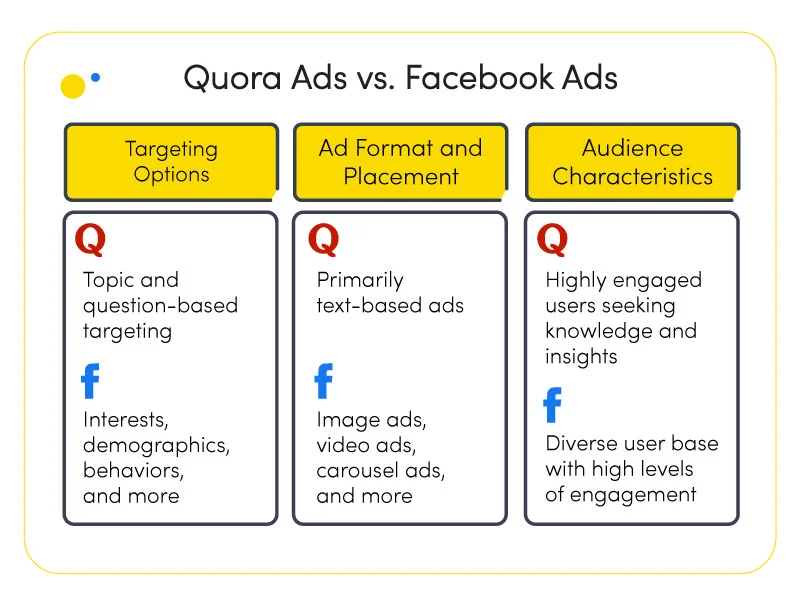
When it comes to audience characteristics and engagement levels, Facebook boasts a massive user base with diverse demographics and high levels of engagement. This makes it suitable for reaching a wide range of audiences. Quora, on the other hand, attracts a highly engaged audience actively seeking knowledge and insights. This presents an opportunity for advertisers to connect with users who are more likely to engage with relevant and informative content.
Understanding these key differences between Quora ads and Facebook ads enables advertisers to tailor their strategies based on the unique strengths and advantages of each platform. By considering the targeting options, ad formats, placements, and audience characteristics, businesses can make informed decisions about where to invest their advertising efforts for optimal results. Also, you can use Quora Ads Spy and Facebook Ads Spy to uncover winning strategies and powerful targeting properties.
Advantages of Quora Ads over Facebook Ads
When it comes to advertising, Quora offers several advantages over Facebook that can benefit businesses looking to reach their target audience effectively.
- Reaching Engaged and Knowledgeable Audiences: Quora is known for its active community of users who actively seek knowledge and insights. By advertising on Quora, you have the opportunity to reach users who are genuinely interested in the topics related to your business. This means your ads are more likely to be seen by an engaged audience that is actively seeking information, making them more receptive to your message.
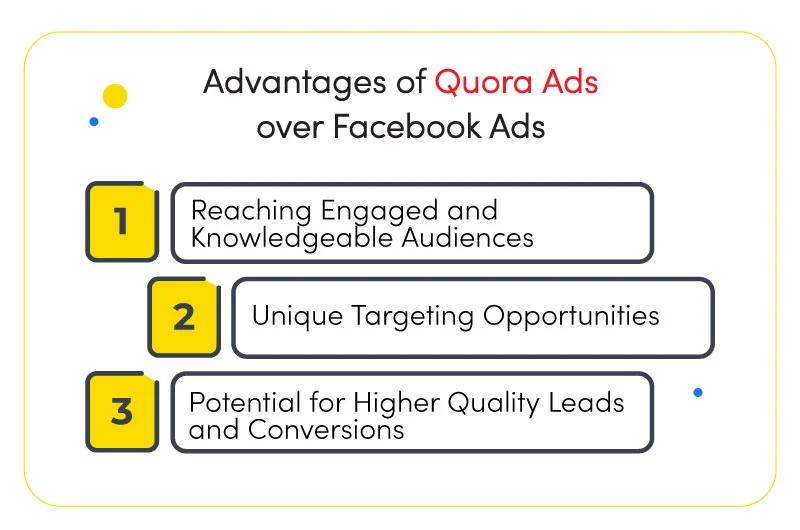
- Unique Targeting Opportunities: Quora’s targeting options are focused on topics and questions, allowing you to align your ads with specific interests and discussions relevant to your industry. This targeted approach helps you connect with users who have a genuine interest in your products or services, increasing the likelihood of driving meaningful engagement and conversions.
- Potential for Higher Quality Leads and Conversions: Due to its nature as a platform for knowledge-sharing and discussions, Quora users tend to have a higher level of expertise and engagement compared to users on other platforms. This means that the leads generated through Quora ads may have a higher quality and are more likely to convert into customers. The platform provides an opportunity to engage with users who have a genuine interest in your industry, leading to more meaningful interactions and potential business growth.
Overall, advertising on Quora can offer unique advantages in terms of reaching engaged and knowledgeable audiences, leveraging targeted opportunities, and potentially generating higher quality leads and conversions. Ahrefs mentioned:
I’ve been using Quora Ads since it began in 2017, spent over $200K advertising for three global brands, and given lectures on how to succeed in it. I’ve managed campaigns on Facebook and Twitter too, so I have a fair comparison of what makes Quora Ads good or bad.
Ahrefs
Comparing Quora Ads and Facebook Ads
When deciding between Quora Ads and Facebook Ads, it’s important to consider various factors related to performance, cost, and campaign objectives. Let’s explore the key points of comparison between these two platforms.
| Aspect | Quora Ads | Facebook Ads |
|---|---|---|
| Performance Metrics and ROI | Emphasizes user engagement metrics | Wide range of metrics including conversions, impressions, clicks, and engagement metrics |
| Cost Considerations and Budgeting | Primarily uses daily budgeting model | Offers daily or lifetime budget options |
| Campaign Objectives and Industries | Suitable for specialized topics or niche markets | Ideal for reaching a wide audience and driving brand awareness |
- Performance Metrics and Return on Investment (ROI): Both Quora Ads and Facebook Ads provide performance metrics to track the effectiveness of your campaigns. However, the specific metrics and their significance may vary. Facebook Ads offers a wide range of metrics, including impressions, clicks, conversions, and engagement metrics. Quora Ads, on the other hand, focuses more on metrics related to user engagement, such as question views, clicks, and conversions. It’s crucial to align your campaign goals with the available metrics to measure success and calculate the return on investment.
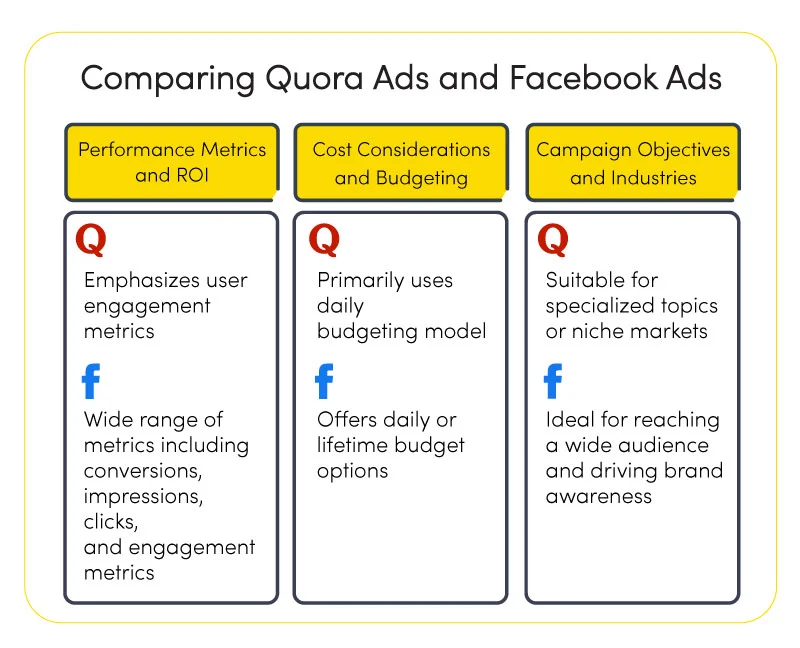
- Cost Considerations and Budgeting: The cost of advertising on Quora and Facebook can vary based on factors such as ad format, targeting options, competition, and industry. Facebook Ads generally offers a wider range of budgeting options, including daily or lifetime budgets, while Quora Ads primarily uses a daily budgeting model. It’s essential to consider your budget and advertising goals to determine which platform aligns better with your financial resources and expectations.
- Considerations for Different Campaign Objectives and Industries: Quora Ads and Facebook Ads can be effective for various campaign objectives and industries, but their suitability may vary. Facebook Ads is known for its extensive targeting options and massive user base, making it ideal for businesses looking to reach a wide audience and drive brand awareness. Quora Ads, on the other hand, offers a unique opportunity to connect with a highly engaged and knowledgeable audience, making it particularly valuable for industries focused on specialized topics or niche markets. Consider your campaign objectives, target audience, and industry-specific dynamics to choose the platform that best aligns with your goals.
By comparing the performance metrics, cost considerations, and campaign objectives, you can make an informed decision about whether Quora Ads or Facebook Ads is the right fit for your advertising needs.
Quora Ads Targeting vs. Facebook Ads Targeting
When it comes to targeting capabilities, both Quora Ads and Facebook Ads offer a range of options to help advertisers reach their desired audience. However, there are some notable differences to consider.
| Quora Ads | Facebook Ads | |
|---|---|---|
| Audience Reach | Niche audience, but may have lower overall reach | Broader audience reach |
| Intent and Interest | Target users based on topics and user engagement | Target users based on demographics, interests |
| Ad Placement | Primarily within the Quora platform | Various placements (news feed, stories, etc.) |
| Ad Creative | Primarily text-based ads | Diverse ad formats (images, videos, carousels) |
- Audience Reach: Facebook has a larger user base, making it a platform with broader audience reach. It allows advertisers to target users based on their demographics, interests, behaviors, and even connections. On the other hand, Quora Ads may have a more niche audience, but it provides targeting options based on topics, questions, and specific users.
- Intent and Interest Targeting: Quora Ads has an advantage when it comes to targeting users based on their specific interests and intent. Since Quora is a question-and-answer platform, advertisers can target users who have shown interest in certain topics or have engaged with relevant content. This can be beneficial for reaching users who are actively seeking information or solutions related to your product or service.
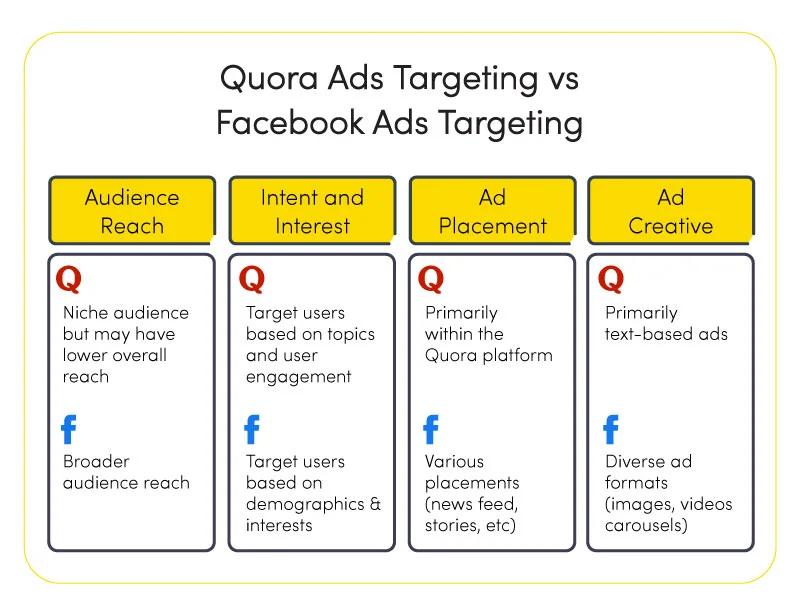
- Ad Placement: While both platforms offer various ad placements, Facebook Ads provide more diverse options, including news feeds, stories, instant articles, and in-stream videos. Quora Ads primarily appear within the Quora platform, including on question pages and in the Quora feed.
- Ad Creative: Facebook Ads offer a wider range of ad formats, including images, videos, carousels, and slideshows. Quora Ads, on the other hand, primarily rely on text-based ads. While Quora has introduced image-based ads, the available options may be more limited compared to Facebook.
Understanding the strengths and limitations of each platform’s targeting options is crucial for maximizing the effectiveness of your ad campaigns. By aligning your targeting strategy with your campaign objectives and understanding your target audience, you can make informed decisions on which platform is best suited for your advertising goals.
Quora Ads ROI Compared to Facebook Ads
When it comes to return on investment (ROI), both Quora Ads and Facebook Ads offer unique opportunities and considerations. The potential ROI on Quora Ads is influenced by factors such as the audience engagement level, the quality of leads generated, and the relevance of your ads to the Quora community. Quora’s engaged and knowledgeable user base can result in higher-quality leads, which may contribute to a potentially higher ROI.
On the other hand, Facebook Ads provide a broader reach and a wide range of targeting options, allowing you to reach a larger audience. The ROI on Facebook Ads is influenced by factors such as ad relevance, targeting accuracy, and the effectiveness of your ad creative. Facebook’s extensive user base and advanced targeting capabilities can help you reach your desired audience effectively.
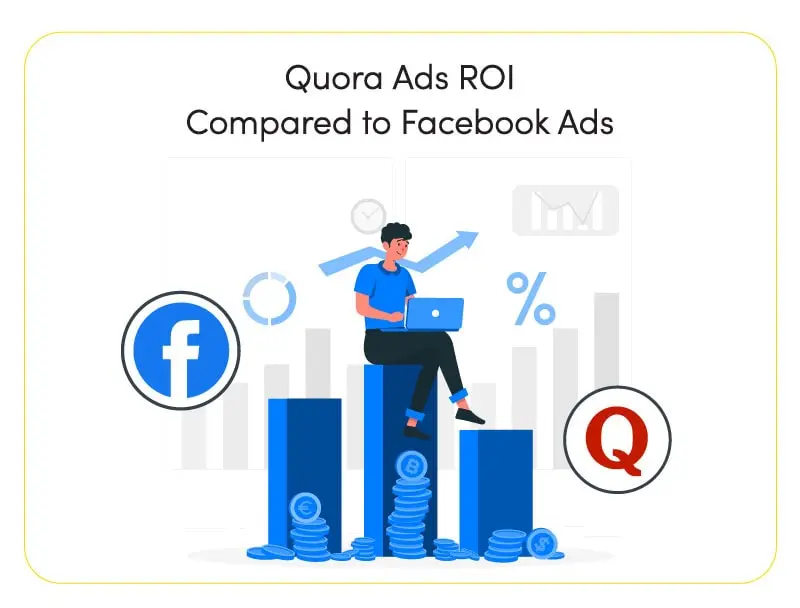
It’s important to note that the ROI potential can vary depending on your campaign objectives, industry, and the specific strategies you employ on each platform. Analyzing the performance metrics, monitoring conversions, and regularly optimizing your campaigns are crucial steps in maximizing the ROI on both Quora Ads and Facebook Ads.
Ultimately, the optimal ROI will depend on your specific business goals, target audience, and the alignment of each platform’s capabilities with your advertising strategy. It’s recommended to monitor and measure the performance of your campaigns on both platforms to make data-driven decisions and continuously refine your advertising approach.
Facebook Ads vs. Quora Ads Performance Metrics
Measuring the performance of your advertising campaigns is essential to evaluate their effectiveness and make informed decisions for optimization. When comparing Facebook Ads and Quora Ads, it’s important to consider the performance metrics and understand the differences in measurement and interpretation.
- Impressions: Impressions refer to the number of times your ad was shown to users. Both Facebook Ads and Quora Ads provide insights into the total impressions your ads receive. However, keep in mind that impressions alone do not indicate the actual reach or engagement of your ads.
- Clicks: Clicks represent the number of times users interacted with your ads by clicking on them. Both platforms track the number of clicks your ads receive, providing valuable insights into user interest and engagement. Monitoring click-through rates (CTR) can help you evaluate the effectiveness of your ad copy and design.
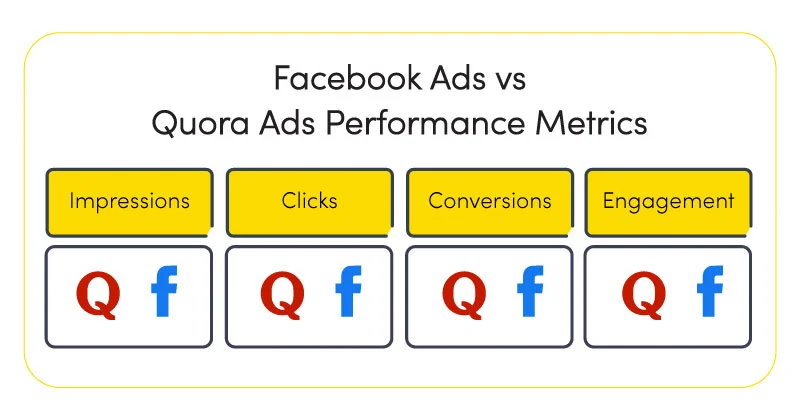
- Conversions: Conversions are actions taken by users that align with your campaign objectives, such as form submissions, purchases, or sign-ups. Facebook Ads and Quora Ads offer conversion tracking capabilities, allowing you to measure the number of conversions generated by your campaigns. Tracking and analyzing conversions is crucial for understanding the ROI and effectiveness of your advertising efforts.
- Engagement: Engagement metrics measure the level of user interaction with your ads, such as likes, comments, shares, and follows. Facebook Ads and Quora Ads provide insights into the engagement metrics, allowing you to gauge the level of interest and audience interaction with your ads. High engagement rates indicate that your ads resonate with your target audience and are effectively driving user interaction.
While both Facebook Ads and Quora Ads provide performance metrics, it’s important to note that the measurement and interpretation may vary due to differences in audience, ad formats, and campaign objectives. It’s essential to align your chosen metrics with your campaign goals and carefully analyze the data to make data-driven decisions.
To effectively measure performance, it’s recommended to set clear objectives, establish relevant key performance indicators (KPIs), and regularly monitor and analyze the performance metrics provided by each platform. By understanding the nuances of performance metrics on Facebook Ads and Quora Ads, you can optimize your campaigns and maximize the results.
Conclusion
In this guide, we explored the key differences between Quora ads vs. Facebook Ads, covering various aspects such as targeting options, ad formats, audience characteristics, performance metrics, and more. By understanding these differences, you can make informed decisions when planning your advertising campaigns.
To recap, Facebook Ads offers extensive targeting capabilities, a vast user base, and diverse ad formats, making it suitable for reaching a wide range of audiences and achieving specific campaign objectives. On the other hand, Quora Ads provides unique opportunities to connect with engaged and knowledgeable users in a question-and-answer format, allowing for highly targeted and niche marketing.
When choosing between Facebook Ads and Quora Ads, it’s important to consider your campaign objectives, target audience, and budget. Facebook Ads may be the preferred choice for businesses seeking broad reach and extensive targeting options, while Quora Ads can be a valuable platform for reaching niche audiences and establishing thought leadership.
Ultimately, the most suitable platform will depend on your specific goals, industry, and target audience. Consider conducting small-scale experiments on both platforms, closely monitor performance metrics, and iterate based on the insights gained. By continually refining your advertising strategies and leveraging the strengths of each platform, you can maximize the effectiveness of your campaigns and achieve your marketing objectives.
FAQs
What are the key differences between Quora ads and Facebook ads?
The key differences between Quora ads and Facebook ads lie in their targeting options, ad formats, and audience characteristics. Quora ads focus on a question-and-answer format, targeting engaged and knowledgeable users, while Facebook ads offer extensive targeting capabilities and diverse ad formats to reach a wide range of audiences.
What are the advantages of advertising on Quora compared to Facebook?
Advertising on Quora offers unique advantages compared to Facebook. Quora provides opportunities to connect with highly engaged audiences, especially in niche industries. It allows for establishing thought leadership and generating high-quality leads and conversions.
How does targeting on Quora ads differ from targeting on Facebook ads?
Targeting on Quora ads differs from targeting on Facebook ads. While Facebook offers extensive demographic, interest-based, and behavioral targeting options, Quora’s targeting revolves around topics and questions, allowing advertisers to reach users based on their interests and expertise.
Which platform offers better ROI: Quora ads or Facebook ads?
The ROI of Quora ads versus Facebook ads depends on various factors such as campaign objectives, industry, and target audience. Both platforms have the potential for positive ROI, but the effectiveness may vary depending on the specific context and campaign strategies employed. It’s important to analyze and monitor performance metrics closely to determine the platform that delivers better ROI for your specific advertising goals.
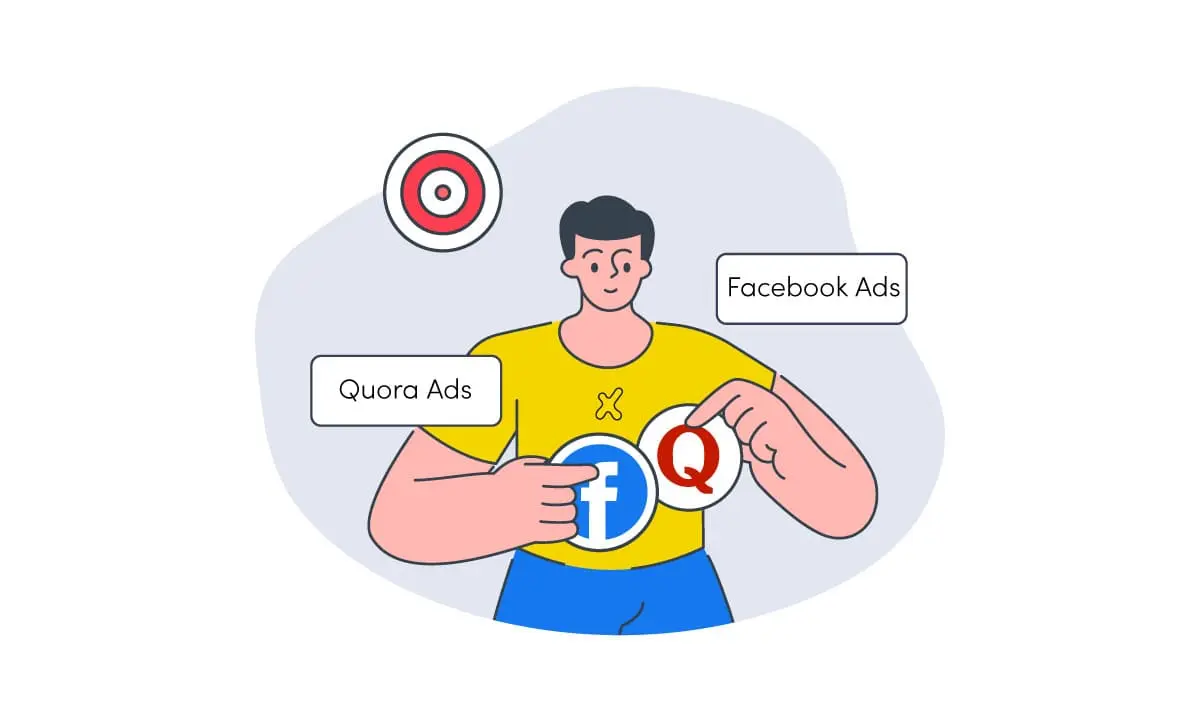


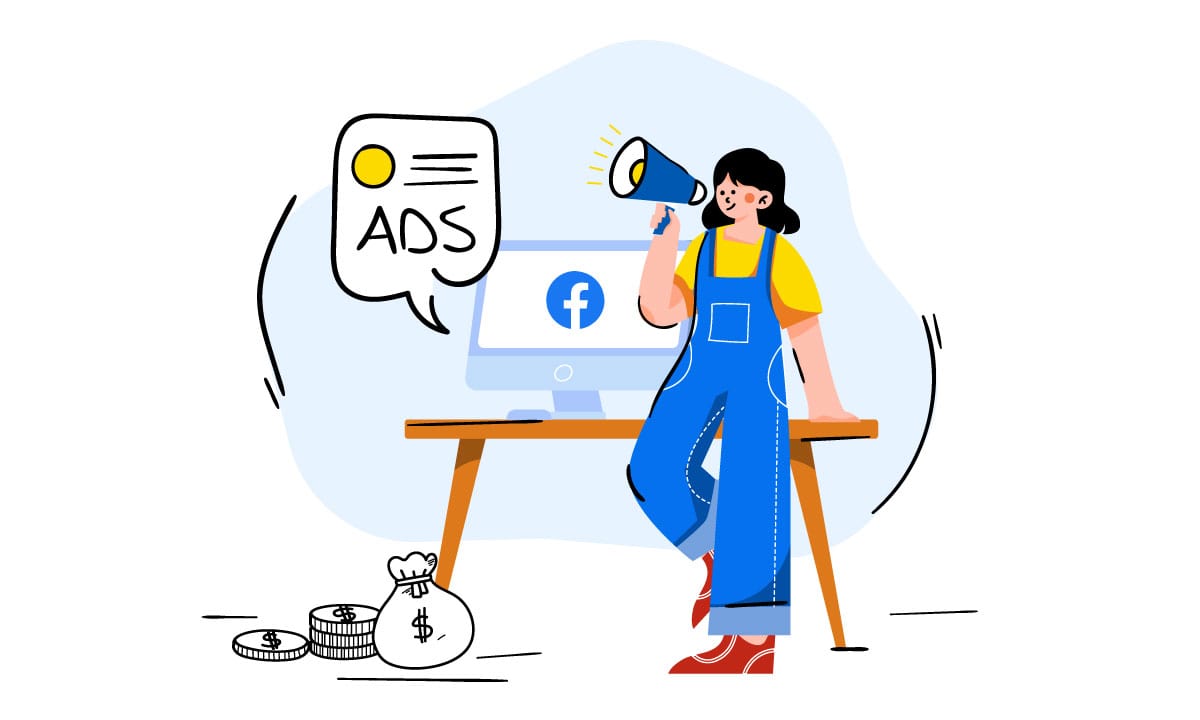



 Facebook Ads Spy Tool
Facebook Ads Spy Tool TikTok Ads Spy Tool
TikTok Ads Spy Tool